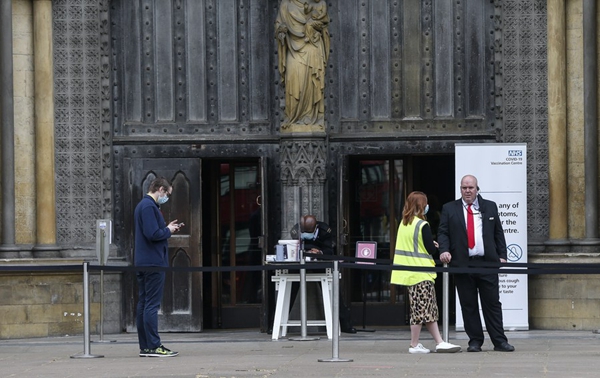
Staff members stand outside an NHS (National Health Service) COVID-19 Vaccination Center at Westminster Abbey in London, Britain, on March 31, 2021. [Photo/Xinhua]
British Prime Minister Boris Johnson on Monday confirmed that from April 12, non-essential shops will reopen and pubs and restaurants will reopen outdoors as Britain moves to step two of the roadmap out of the COVID lockdown.
Meanwhile, hairdressers and barbers as well as gyms and spas can reopen, along with zoos, theme parks, libraries and community centers.
"The net result of your efforts and of course the vaccine rollout is that I can today confirm that from Monday April 12, we will move to step two of our road map," said the prime minister.
The statement came as the prime minister was speaking at a virtual Downing Street press conference to give an update on his government's anti-coronavirus plan.
"But we can't be complacent we see the waves of sickness afflicting other countries, we've seen how this story goes we still don't know how strong the vaccine shield will be when the cases begin to rise as I'm afraid they will," he said. "Which is why we are saying please get your vaccine or your second dose when your turn comes."
Johnson said he will "cautiously but irreversibly raise a glass" to the vaccine rollout and easing of rules, adding that he "sees nothing in the present data that makes me think we'll have to deviate from the roadmap".
"We set out our roadmap and we're sticking to it," he said.
On Feb. 22, Johnson announced his roadmap exiting the lockdown, the third of its kind since the start of the pandemic. The four-step plan is expected to see all legal restrictions in England being removed by mid-June.
The prime minister said England has managed to meet the "tests" set by the government sufficiently to go ahead with further easing restrictions on Monday.
The government previously set out four "tests" for easing lockdown: the vaccine programme continues successfully; vaccines are effective in reducing hospital admissions and deaths; infection rates do not risk overwhelming the British National Health Service (NHS), and the variants of concern do not pose a large risk.
Nearly 31.6 million people have been given the first jab of the coronavirus vaccine, according to the official figures.
At the same time, Johnson said there is no decision yet on when international travel can resume.
The prime minister stressed that he does not want to "underestimate" the risk of travelers importing the virus into Britain.
Asked whether he can rule out whether vaccine passports will be used at the pub, Johnson said that they will certainly not be used next Monday when venues open outdoors.
He said the government is being careful to avoid a system which is "discriminatory", as some people such as pregnant women cannot get vaccinated for medical reasons.
"I want to stress there are complicated ethical and practical issues raised by the idea of COVID status certification because many people for many reasons may be unable to get a vaccine for medical reasons or perhaps they are pregnant or whatever," he said. "You have to be very careful in how you handle this and don't start a system that is discriminatory."
"But obviously we are looking at it and some test events, getting 20,000 people into Wembley on May 15," he added.
He added that large-scale events will "absolutely" need measures such as testing when they are allowed to go ahead again.
The prime minister said the rapid mass testing "will be a great advantage of us all."
Also on Monday, the British government published the latest findings from its reviews of COVID status certification, so-called "vaccine passports", and international travel.
The review suggested a certification scheme could have an "important role to play both domestically and internationally, as a temporary measure," but Johnson faces opposition from MPs on both sides of the House of Commons, lower part of the British parliament, who are reportedly concerned about the civil liberties implications.
A certificate could cover whether someone had received a vaccine, had a negative coronavirus test or had contracted and recovered from COVID-19 within the past six months.
Earlier Monday, British health authorities announced that everyone in England will be able to take a free rapid COVID-19 test twice a week from Friday as the government seeks to extend its testing program.
The lateral flow kits, which can provide results in around 30 minutes, will be available for free at testing sites, pharmacies and through the post.
Joining Johnson at the press briefing, England's Chief Medical Officer Chris Whitty confirmed that the number of people in hospital with COVID-19 has been steadily falling from the peak and is continuing to fall.
The number of people dying with the virus has also been steadily decreasing and a faster rate than during the first peak, thanks to a combination of lockdown measures plus the effects of vaccines, according to Whitty.
The average number of deaths is now about 47 a day, down from a peak of about 1,300 a day earlier in the year, Whitty said.
Another 2,762 people in Britain have tested positive for COVID-19, bringing the total number of coronavirus cases in the country to 4,362,150, according to official figures released Monday.
The country also reported another 26 coronavirus-related deaths. The total number of coronavirus-related deaths in Britain now stands at 126,862. These figures only include the deaths of people who died within 28 days of their first positive test.
Experts have warned that despite progress in vaccine rollout, Britain is "still not out of the woods" amid concerns over new variants and the third wave of pandemic in the European continent.
To bring life back to normal, countries such as Britain, China, Russia, the United States as well as the European Union have been racing against time to roll out coronavirus vaccines.




